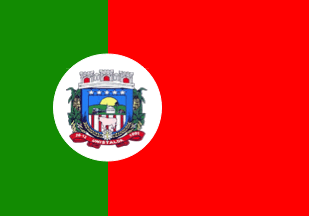 image by Ivan Sache, 8 August 2020
image by Ivan Sache, 8 August 2020
Last modified: 2020-08-08 by ian macdonald
Keywords: rio grande do sul | unistalda |
Links: FOTW homepage |
search |
disclaimer and copyright |
write us |
mirrors
 image by Ivan Sache, 8 August 2020
image by Ivan Sache, 8 August 2020
The municipality of Unistalda (2,450 inhabitants in 2010; 60,239 ha) is
located
Unistalda emerged in 1935-1936 during the building of the railway
connecting Santiago and SŃo Borja by the Railway Battalion, commanded by General
Horta Barbosa. The delimitation of the streets of a town started in 1937. Act
214 issued on 30 May 1938 by the Municipal Council of Santiago renamed the town
to Unistalda, after the name of the the general's mother. In 1940, Emiliano
Trindade and his wife Ascelino Loureiro offered plots to build the new town.
Unistalda was elevated to the 4th district of Santiago by Municipal Act issued
on 29 August 1940.
The municipality of Unistalda was established by State Law
No. 10,648 promulgated on 28 December 1995 and inaugurated on 1 January 1997.
http://www.unistalda.rs.gov.br/
Municipal website
Ivan Sache, 8 August 2020
Vertically divided 1:2 green and red with the municipal arms in a white disk
on the field boundary.
Dirk Sch÷nberger, 1 May 2012
The flag of Unistalda is prescribed by
Municipal Law No. 66 promulgated on 29 December 1997.
Article 1.
The
flag of the municipality of Unistalda has for official colors green, white and
red, arranged in two panels inspired by the flag of Portugal and the colors of
the flags of Italy and Rio Grande do Sul, represented as follows:
a) Red
(gules) is a symbol of dedication, patriotic love, audacity, intrepidity,
courage and valiance.
b) Green (vert) is a symbol of honor, civility,
courtesy, glee, abundance and hope, since greening plains and fields promise
profuse harvests.
c) White is a symbol of peace, friendship, integration,
work and community's harmony.
Article 2.
The flag obeys the following
rules.
I - The flag shall be composed of two panels, green and red in usual
shades, forming a rectangle, and of a white circle, symmetrically placed between
the two rectangles, the green rectangle being placed at the flag's left, with 7
units, and the red rectangle at the right, with 13 units.
II - The flag shall
be charged in the center with a white panel, of 7 units, featuring the municipal
coat of arms.
Article 3.
The flag obeys the following rules.
I -
The flag's width is 14 units.
II - The flag's length is 20 units.
III -
The coat of arms shall have a width of 7 units, leaving 3 units in the upper
part and 3 units in the lower part.
https://leismunicipais.com.br/a/rs/u/unistalda/lei-ordinaria/1997/7/66/lei-ordinaria-n-66-1997-institui-a-bandeira-municipal-de-unistalda-e-da-outras-providencias
Leis Municipais database
The coat of arms of Unistalda is prescribed
by Municipal Law No. 44 promulgated on 8 August 1997.
Article 1.
a) A
classical shield, in Portuguese style, compliant with international heraldry,
used to symbolize a 3rd rank municipality with power and sovereignty over its
territory.
b) The coat of arms features dexter a field azure charged with
mountains vert and a sun or and in front of a building argent, a locomotive of
the Maria Fumaša type argent and sable and a tractor of the same. In the
background an araucaria sable. In base a field argent barry gules and sable
charged with a bovine argent and sable. In chief a blue field charged with five
stars argent and sable and wheat plants argent, or and sable. The shield
supported dexter and sinister by a maize cob vert, or and sable superimposed
with soybean leaves and pods vert, or and sable, tied by a scroll gules
inscribed with the toponym "28-12" "UNISTALDA" "1995". The shield surmounted by
a mural crown argent, gules and sable.
c) Detailed description.
The coat
of arms of Unistalda in Portuguese style alludes to the local people and the
discoverers of the fatherland, a style used by most Brazilian municipalities.
The blue field in chief and surrounding the central escutcheon with stars
represents the Southern Cross and the nightly sky over the hills that
predominate in the local topography. [...] The old locomotive "Maria Fumaša" is
a tribute to the old railway station, kept until now as a vivid memory of the
settlement. The tractor represents the force of the plant production extracted
from the soil. The vertical bars represent the railway. The bovine represents
cattle-breeding, a great source of income both in the past and now. Maize and
soybean are two crops of significance for local economy. The scroll represents
protection and power. The mural crown with three towers identifies a town of 3rd
rank; the three red gates represent the three powers, Executive, Legislative and
Judiciary.
d) Color description.
Or (gold) represents wealth and work.
Azure (blue) represents peace and knowledge. Argent (silver and white)
represents justice and faith. Vert (green) represents life, nature and hope.
Gules (red) represents justice, work and power. Sable (black) represents
prudence and protection.
https://leismunicipais.com.br/a/rs/u/unistalda/lei-ordinaria/1997/5/44/lei-ordinaria-n-44-1997-institui-o-brasao-do-municipio-de-unistalda-e-da-outras-providencias
Leis Municipais database
Photos
https://www.facebook.com/camaradeunistalda/photos/a.2206043156386905/2529152247409326/?type=3&theater
https://novapauta.com/2019/10/elas-cavalgaram-com-bandeira-da.html?m=0
Ivan Sache, 8 August 2020